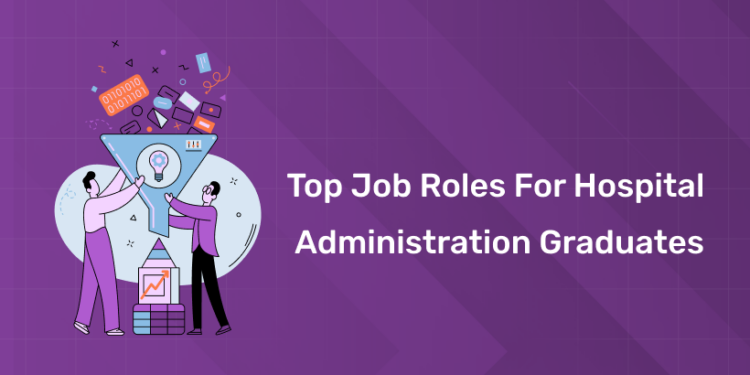Table of Contents
For graduates entering the field of hospital administration, the possibilities are vast and promising. From ensuring the smooth operation of healthcare facilities to pioneering advancements in digital health, hospital administration professionals play a vital role in shaping the future of healthcare. In this blog, we delve into the top job roles for hospital administration graduates, providing insights into career opportunities, responsibilities, and the dynamic landscape of this critical profession.
Explore Your Future in Hospital Administration! Enroll now
Top Job Roles for Hospital Administration Graduates: Introduction
Hospital administration is a pivotal field that ensures healthcare facilities operate efficiently, comply with regulations, and deliver high-quality patient care. In today’s evolving healthcare landscape, effective management has become more critical than ever. The demand for skilled hospital administrators has grown significantly, driven by advancements in medical technology, policy changes, and the increasing complexity of healthcare systems. For graduates specializing in hospital administration, a wealth of career opportunities awaits across diverse sectors.
This blog explores the various career paths available for hospital administration graduates, their core responsibilities, and the unique roles in both public and private sectors. Whether you’re an aspiring professional or a recent graduate, this guide will help you navigate your options and prepare for a successful career in hospital administration.
Career Opportunities in Hospital Administration
1: What is the primary role of a hospital administrator?
The healthcare sector relies on skilled administrators to tackle operational, financial, and strategic challenges. Hospital administration is essential in bridging clinical care, administrative processes, and policy implementation.
Industry Growth and Demand
- Global Demand: The World Health Organization (WHO) stresses the need for efficient healthcare management, making hospital administration a growing field worldwide. Administrators improve care quality, resource use, and health outcomes.
- Technological Advancements: Innovations like health informatics, telemedicine, and AI create demand for administrators skilled in these technologies. They oversee integration, data security, and operational efficiency.
- Policy Changes: Shifts like value-based care models emphasize patient satisfaction and cost-effectiveness. Administrators implement these changes while ensuring compliance with evolving regulations.
Key Employment Sectors
- Hospitals (Public and Private): Administrators manage day-to-day operations, finances, patient satisfaction, and regulatory compliance in diverse settings.
- Clinics and Ambulatory Care Centers: These smaller facilities require managers to oversee staffing, patient flow, and financial management, ensuring seamless operations.
- Health Insurance Companies: Professionals handle claims, manage provider networks, and maintain compliance with industry policies to enhance service delivery.
- Government Health Departments: Roles here involve implementing policies, coordinating public health programs, and allocating resources effectively for community health.
- Pharmaceutical Companies: Administrators contribute to logistics, marketing, and healthcare provider engagement, ensuring alignment with healthcare trends.
- NGOs and Global Health Organizations: These positions focus on strategic planning, resource allocation, and project management to address global health challenges and improve public welfare.
Hospital Administration Course with Assured Career Growth
Hospital Administration Course by Entri App: Master essential healthcare management skills, gain certification, and secure top roles in leading hospitals
Join Now!Responsibilities of Hospital Administration Professionals
Hospital administrators play a critical role in ensuring healthcare facilities operate smoothly, meeting the needs of patients, staff, and regulatory bodies. Their diverse responsibilities span core and specialized areas, adapting to the needs of their organization and its goals.
Core Responsibilities
- Operational Management: Administrators manage daily activities, such as staffing, scheduling, and resource allocation, to ensure efficient operations. They address logistical challenges, maintain service quality, and coordinate interdepartmental activities.
- Financial Oversight: Handling budgets, financial planning, and cost analyses, administrators ensure financial sustainability. They evaluate operational expenses, negotiate contracts, and identify cost-saving opportunities without compromising care quality.
- Regulatory Compliance: They monitor adherence to healthcare laws, regulations, and accreditation standards, minimizing legal risks. This includes maintaining licensure, conducting audits, and staying updated on policy changes.
- Patient Care Coordination: Administrators strive to improve patient experiences by optimizing service delivery, addressing complaints, and ensuring timely care. They collaborate with clinical teams to enhance care quality and streamline patient pathways.
- Technology Integration: Hospital administrators implement and manage digital tools like Electronic Health Records (EHRs), telehealth systems, and other healthcare technologies. They ensure systems are user-friendly, secure, and compliant with data protection regulations.
Specialized Responsibilities
- Strategic Planning: Developing long-term strategies for facility growth, market positioning, and quality improvement, administrators align organizational goals with industry trends. This involves analyzing market data and predicting future challenges.
- Emergency Preparedness: Administrators design and implement disaster response plans to ensure healthcare facilities are prepared for emergencies. They oversee training, resource allocation, and coordination with external agencies during crises.
- Quality Assurance: Monitoring performance metrics, healthcare outcomes, and patient satisfaction, administrators work to maintain high standards. They analyze data, identify areas for improvement, and implement corrective actions.
Explore Your Future in Hospital Administration! Enroll now
Hospital Administration Job Roles in Public and Private Sectors
Hospital administration roles span public and private sectors, offering diverse career opportunities tailored to societal needs, innovation, and efficiency.
Public Sector Opportunities
Public sector roles prioritize community welfare, large-scale health service management, and policy execution. Key positions include:
- Hospital Administrator: Oversee government hospital operations, including staffing, budgeting, and ensuring compliance with national health policies. They manage patient services and resource allocation.
- Regional Health Manager: Supervise multiple facilities within a region to maintain uniformity in care standards and resource efficiency. Responsibilities include inter-hospital coordination and performance evaluation.
- Policy Implementation Specialist: Work with government health departments to execute public health initiatives and reforms, such as immunization drives and disease prevention programs.
- Emergency Preparedness Coordinator: Design and manage disaster response plans for public hospitals, ensuring readiness for natural disasters, pandemics, or other crises through resource allocation and staff training.
Private Sector Opportunities
Private sector roles emphasize innovation, profitability, and patient satisfaction, with opportunities including:
- Corporate Hospital Manager: Lead operations in private hospitals, focusing on quality care, patient satisfaction, and financial sustainability. Responsibilities may include strategic planning and staff performance management.
- Clinic Manager: Manage outpatient and specialty clinic operations, ensuring efficient scheduling, staffing, and service delivery to enhance patient experiences.
- Health Insurance Specialist: Work with insurance firms to manage claims processing, coordinate with providers, and handle customer service issues. This role often involves policy evaluation and fraud detection.
- Healthcare Consultant: Provide expert advice to organizations on improving operational efficiency, regulatory compliance, and profitability. Consultants often identify growth opportunities and implement strategic changes.
Emerging Roles
Healthcare’s evolving landscape has created roles that combine administration with technological expertise, such as:
- Health Informatics Specialist: Manage and analyze healthcare data, electronic health records (EHRs), and digital tools to optimize care delivery and improve decision-making processes.
- Telemedicine Administrator: Oversee virtual healthcare services, including staff training, technology deployment, and compliance with regulations for remote care delivery.
- Technology Integration Manager: Lead the adoption and integration of advanced medical and administrative technologies, ensuring seamless operation and staff adaptation.
Explore Your Future in Hospital Administration! Enroll now
Top Job Roles for Hospital Administration Graduates: Conclusion
Hospital administration offers a wide range of career opportunities for graduates passionate about improving healthcare systems. From managing hospital operations to pioneering technological integration, the field provides diverse and rewarding pathways. As the healthcare industry continues to evolve, hospital administration professionals will play a critical role in shaping its future. For graduates, the key to success lies in continuous learning, adaptability, and a commitment to excellence.
Hospital Administration Course with Assured Career Growth
Hospital Administration Course by Entri App: Master essential healthcare management skills, gain certification, and secure top roles in leading hospitals
Join Now!Frequently Asked Questions
What are the main job roles available for hospital administration graduates?
Hospital administration graduates can pursue roles such as Hospital Administrator, Regional Health Manager, Clinic Manager, Corporate Hospital Manager, Health Insurance Specialist, and Healthcare Consultant. Emerging roles include Health Informatics Specialist, Telemedicine Administrator, and Technology Integration Manager.
What skills are essential for success in hospital administration roles?
Key skills include leadership, financial management, regulatory compliance expertise, strategic planning, and familiarity with healthcare technologies like EHRs and telemedicine platforms. Strong communication and problem-solving skills are also vital.
What is the difference between public and private sector hospital administration jobs?
Public sector jobs often focus on community health, large-scale operations, and policy implementation, such as roles in government hospitals or health departments. Private sector roles emphasize innovation, efficiency, profitability, and patient satisfaction, including positions in corporate hospitals, outpatient clinics, and insurance firms.
How is technology shaping hospital administration careers?
Technology is revolutionizing hospital administration with roles like Health Informatics Specialist and Telemedicine Administrator. Professionals manage digital tools such as electronic health records, virtual healthcare services, and data analytics to enhance care delivery and operational efficiency.
What career growth opportunities exist in hospital administration?
Hospital administration offers clear paths for career growth. Graduates can advance from entry-level roles like Assistant Administrator to senior positions such as Hospital CEO, Regional Manager, or Consultant. Specialized roles in health technology and policy implementation also provide opportunities for upward mobility.
Do hospital administration roles require a medical background?
No, a medical background is not mandatory. However, familiarity with healthcare operations and medical terminology is advantageous for managing clinical and administrative tasks effectively.
What certifications enhance a hospital administration career?
Certifications like Certified Healthcare Administrative Professional (CHAP), Certified Healthcare Financial Professional (CHFP), and certifications in Health Informatics or Project Management can improve job prospects.
Can hospital administration graduates work internationally?
Yes, hospital administration is a global career. International roles often require knowledge of global healthcare systems, cross-cultural communication, and regulations specific to the region.
Can hospital administration graduates work in research organizations?
Yes, graduates can manage operations in healthcare research organizations, focusing on project management, regulatory compliance, and resource allocation for clinical trials and studies.












